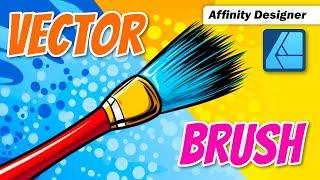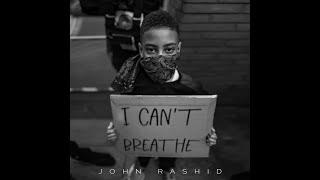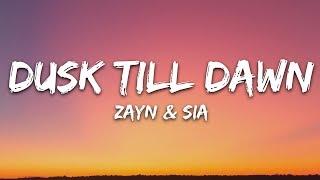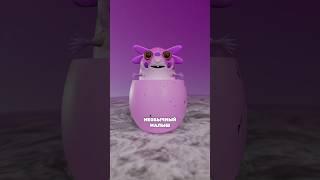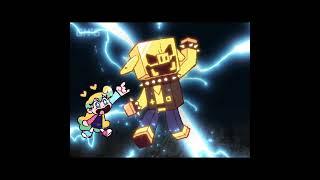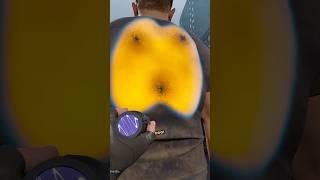
Brush Up On Vector Brushes - Affinity Designer Tutorial
Комментарии:

We are appreciate your hard work
Ответить
You can also avoid the tails at the start or end of the stroke by turning on the rope stabilizer. You can leave the rope short if you don’t want too much smoothing. The cause is probably a combination of Affinity’s attempt to draw the entire png pattern and any involuntary movement of the users hand at the start and stop of the stroke. You can easily get extra nodes due to that or a node handle pointing in the wrong direction. The rope stabilizer will smooth you hand motion and make sure the nodes are facing the correct direction.
Ответить
Thank You AGAIN!!
Ответить
Trent, I really appreciate that you share your skills with us. There is always something that I haven't figured out yet and love that you give background knowledge with terminology that I'm usually not sure about its exact meaning. A huge thumbs.
Ответить
Brilliant Trent. Great explanations on the differences of vector brushes. Never new the repeating pattern trick as shown in your stars brush. Will def use this idea in future. Video saved for rewatching and step by step trials my end. 👍
Ответить
Great video... I have a question. On the solid brush option, I like how you can taper the ends and customize it that way. Is it still not going to be scalable like the other vector brushes? I only ask because I do a lot of floral work and I have been using the stroke studio to edit the way the stroke behaves to make easier petal and leaf shapes, but now I am wondering if maybe playing with the brush studio might be something to try? I am relatively new to AD so I might not be asking the right questions but hopefully you can understand. Thanks for any help you can offer... and you now have a new subscriber too!
Ответить
You could talk about the pressure panel (the "hidden" button at the bottom of the stroke panel) It´s a big tool for illustrators.
I´m a new subscriber and I´m enjoying so much your channel, very informative and didactic. Many thanks.

The inability to expand "vector" brush strokes and the lack of true vector brushes matters! As an in-house designer, I put an asset together that we needed scalable and it was quite a bummer to realize on export that brush strokes aren't vector. I've steered clear of them ever since. True vector brushes are one of my top feature needs from Affinity right now. That and vector pattern fill such as halftone. (I know Photo has halftone, but it's not vector.)
Ответить
i can't expand stoke effect help me pl.
Ответить
Hi Trent. Thank you for this video. I have a question. I am making hand drawn menus for our deli and have been using photo for this. But I am finding more often than not that as I change and rework the menu, especially over various delis that differ slightly in what they offer, I lose resolution and quality. I try with sharpening and a bunch of other tricks I've figured out along the way but still have very choppy lines in the end. So I thought to try vector brushes and have been looking for tutorials to get started. I haven't used Designer yet. Your video is very helpful, but then, you reveal that it is not a true vector brush. My simple question is this: Is it closer to what I want, to be able to make changes, not so much scaling but reworking, and not lose quality? If that is so, it may be worth the switch for me. If you have any suggestions, these would be appreciated as well. thank you so much!
Ответить
Hi Trent, thank you for your reply! I have had Designer for 3 years and haven't used it. But I realized that I need to. So yesterday, working with the brushes the basic round brush is as you say. But, our menus are rustic! So I need a little roughness to the line. I tried every one and haven't found one that works right yet. I tried making some myself. They were rough edges in a smooth sort of way. But when I exported them as .png files, they went fuzzy! Every time! I tried to import my brushes from Photo and they say they say they imported but they do not show up in my brush sets. Are there any good brushes for free that you can suggest that may have such a brush? thank you so much for your help!
Ответить
As a beginner who is just playing around with Designer 2 to see if it can help me edit my handpainted art, your videos are amazing. So clearly explained, everything makes more sense to me now. Thanks!
Ответить
biggest problem is the png image brush. It doesnt export as vector! so comes out all pixelated 😢
Ответить
You have answered some odly basic questions about some lil things so thank you so much for your great explanations of tools and more. and your handsome.
Ответить
Great tutorial, nicely explained and very helpful, thank you 👍
Ответить
Subs to the channel!
This is amazing, Trent! Just bought my own universal license and I'm having fun creating random stuff while exploring the tools and features, and watching tutorials.

Maybe, if it is called "Vector" it would be cool creating it not only with a .png graphic, but with one vector drawing.
Ответить
I was dismayed when I finally realized that "vector" brushes in Affinity aren't truly vector, as they have been in Illustrator for decades. IMHO, this remains one of Affinity's biggest downfalls--and I am a huge fan and proponent of Affinity. Hoping that the added resources from Canva will remedy this early; that would definitely have a positive effect among those who are sour on the sale.
Ответить
Thanks for the tutorial. What would you recommend for fixing slight pixelation around the edges of artwork created with their oil, pastel, and marker brushes when I print at 300 dpi?
Ответить
This is extremely useful information, thanks.
Ответить
Hey Trent!
I have both Affinity and Illustrator. I want to learn to make those layered wood art pieces, some call them a mandala but they’re more than that. Which of the two tools would be better? I realize they’re both great vector tools, but is one or the other better at this? I saw someone making a design in illustrator and I liked that you could see all the layers at once on the canvas, in different colors and then stack them to sort of get an idea or clue at least of how they would look cut and stacked. Thank you!

Fake vector brushes and the lack of raster tracing are just not normal. I jump back to Corel Draw and Illustrator. Thanks for the review!
Ответить
I think the title is not correct. There is a difference between vector and pixel. That is Pixel Brush. Affinity can't make vector brush. Thank you
Ответить
if I apply those textures to my shapes in Affinity Designer, can I still import everything (shapes and vector brush textures) into After Effects for animation?
Ответить
Great tutorial I followed the instructions but I found that once you use the brush a sheen of sorts is left in the background and this is mostly undesirable. I just want to see the stars in the brush transparent not sure why this is not possible.
Ответить
Amazing video. Thank you.
Ответить
What a lifesaver thank you! I am new to all this but you demystified it! Thank you!
Ответить
The vector brush looks and acts very similarly to the one in Xara Designer. I was on the fence aabout switching to Affinity Designer from Xara (of wihch I own a 10-year old one-time purchase) but I ended up sticking with Xara.
Ответить
